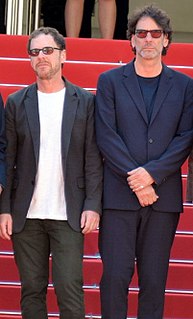Top 35 Quotes & Sayings by Joel Coen
Explore popular quotes and sayings by an American director Joel Coen.
Last updated on April 14, 2025.
Sometimes, in certain stories, I think we know at the outset essentially what the tone is going to be, or it becomes important that we're groping toward some kind of story with a certain kind of tone that we both get somehow. But I don't think how that's combined with other elements is ever in any way overtly discussed.






















